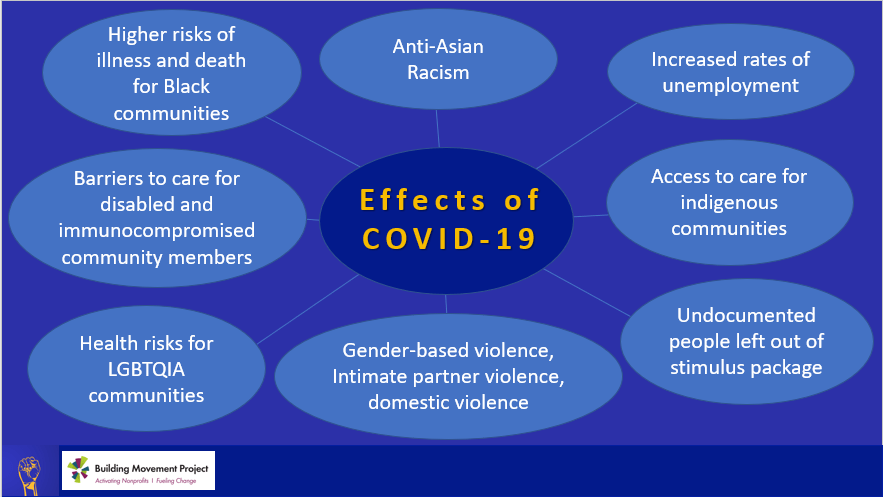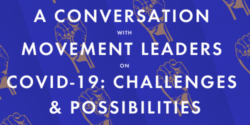Apr
20
2020
Written by Deepa Iyer
On April 14, 2020, Building Movement Project and Solidarity Is hosted a webinar with four women of color who work with Latinx, Asian, Black, and Native communities around the United States. Our goals for the webinar were to shine a spotlight on how COVID-19 affects communities of color and immigrants; to understand how organizations serving and organizing in these communities are pivoting in this moment and what is required from government, policy makers, and philanthropy; and to imagine what a post-COVID-19 society could look like. Our panelists included Linda Campbell of Detroit People’s Platform, Aarti Kohli of Advancing Justice – Asian Law Caucus, Judith LeBlanc of Native Organizers Alliance, and Claudia Medina of Enlace Comunitario.
Below are three takeaways from our conversation. You can also watch the recording below, read the transcript here, and access a list of related materials here.
1. It’s true that COVID-19 is an equalizer because it can affect anyone. But underlying social, health, and economic disparities as well as the politics of racism and xenophobia mean that communities of color and immigrants are facing disproportionate and devastating effects.
The coronavirus pandemic is only revealing and unmasking what community advocates have been saying for decades: that our society has yet to dismantle the policies, practices, and systems of white supremacy, slavery, settler colonialism and xenophobia. In the absence of equitable and inclusive policy change, communities of color and immigrants will experience any public emergency in devastating ways. Judith LeBlanc pointed out that Indian country is dealing with the systemic underfunding of healthcare facilities, overcrowded housing, pre-existing health conditions, water access, and lack of racial data collection – all of which have heightened the impact of COVID-19 on Native communities (more here and here). Claudia Medina explained that Latinx immigrants are facing dire economic consequences of COVID-19 because they have lost their jobs and health insurance. Undocumented immigrants aren’t covered by the federal stimulus package as of yet. In addition, reports of domestic violence have increased during this time (more here and here). Aarti Kohli noted that Asian Americans are dealing with a range of issues, from Southeast Asians in immigrant detention centers where COVID-19 is spreading to the economic shutdowns of Chinatowns around the country to the racism and scapegoating of East Asian and Southeast Asian communities (more here and here). Linda Campbell emphasized that the underlying health disparities Black communities face have led to high rates of illnesses and deaths in cities like Detroit, New Orleans, and Chicago. Black communities also face barriers in accessing social services, from water access to housing (more here and here).
In addition, non-profit service providers have had to pivot their work in significant ways, from moving to remote work, learning how to use digital technology, providing tele-counseling and safety planning services, and changing the way they show up in community by relying on phone calls and texting.

2. Recovering from the pandemic will require long-term investments and infrastructure from government and philanthropy.
Our panelists emphasized that policymakers, all levels of government, and philanthropy must redouble their efforts not only in response to the emergency but for the long run. Aarti Kohli emphasized the importance of competitive and responsive government infrastructure at the neighborhood and local levels as a core building block for supporting vulnerable communities. Linda Campbell encouraged philanthropy to invest in frontline organizations, many of whom are led by women of color, and to have a long view approach. Judith LeBlanc noted that philanthropy must help to bridge the digital divide and ensure WiFi and broadband access for Native communities, as well as invest in leadership development and political education efforts. Claudia Medina brought up the importance of sustaining long-term organizational development particularly in smaller, under-resourced organizations. In other words, while our panelists believe that rapid response funding is vital in this moment, they also noted that philanthropy must stay on the scene well after the immediacy of the crisis is over.
3. “We can’t go back to the way things were”: There is no “return to normal” option.
We asked our panelists to imagine a post-COVID society. The theme that came up time and again: it’s time to be bold and demand what our communities need and deserve without compromise or sacrifice.
Judith LeBlanc reminded us that COVID-19 has been a “total, permanent, political, economic, social, and cultural interruption” and that we must return to our spiritual and ancestral roots. Claudia Medina urged us to take this tremendous opportunity and push forth a bold agenda for marginalized peoples to gain power. Aarti Kohli encouraged us to build on an intersectional cross-movement approach that deepens the bonds of solidarity with each other. Linda Campbell urged us to contend with the historical legacies of oppression, particularly slavery.
In order to create an equitable and inclusive post-COVID society, we must dismantle the disparities that got us to this moment, invest in competent infrastructure at all levels of government, support and sustain frontline responders, service providers and movement groups for the long run, and create opportunities for education, leadership development, and political power.

